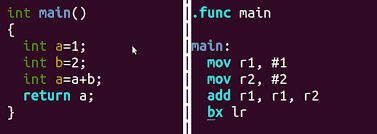CSS PROGRAMMING LANGAUGE disadvantages CSS full form is cascade style sheets , which we call it says about how you should display the HTML elements on the screen. CSS tells us the style of the webpage let us take a simple example, if we build a home first we lay out the design that is known as the HTML language. Where the CSS means layout which means giving instructions on how the furniture should be nothing but the CSS. For example if we take PayPal we can see that the background color blue says the CSS background-color property. Netflix is also the best way of saying CSS property, but if we remove it will be a normal webpage but with the red color and the black plus symbols it looks like the best webpage. Versions of CSS There are differen...
WHAT IS A FUNCTION
A self-contained, named block of code that performs the specific task when called is nothing but a function.
Note:-functions are the task performers in C projects.
FUNCTIONS CLASSIFICATION
We have 2 types of functions they are user-defined functions and library functions.
A pre-created function that comes with C installation is nothing but a library function, For eg:- print () and scanf().
Library functions are ready-made named code blocks. We need not create them, Just use them in our programs.
We can make use of this library function by making the library function available to the program and the next step is calling the library function.
Our own created function which is the program-created function is nothing but a user-defined function, eg- the main function is the example of a user-defined function.
BENEFITS OF USER-DEFINED FUNCTION
- There are many benefits of user-defined functions, the first one is code reusability which means we can use the code a number of times as when we want in the program writing.
- The second one is modularity is another thing of a user-defined function. Make use of this user-defined function by declaring the function that is the prototype, calling function.
SYNTAX TO DEFINE FUNCTION
<return type> <identifier>(parameters){ <task performing code> }
void add()//function header
The elements of a function definition function header,body code enclosed between two flower braces are nothing but a function body.The function body has 2 parts task performing return statement(optional).
OUTPUT PROGRAMS
- //addition1.c #include<stdio.h> void add(); main() { } void add() { int n1,n2,sum; printf("Enter the first number:"); scanf("%d",&n1); printf("Enter the second number:"); scanf("%d",&n2); sum=n1+n2; printf("The sum of %d and %d is %d",n1,n2,sum); }
//addition2.c #include<stdio.h> void add();//prototype of the function main() { add();//calling the function } void add() //defining the function { int n1,n2,sum; n1=20; n2=30; sum=n1+n2; printf("The sum is %d",sum); }
//addition2.c #include<stdio.h> void add() //defining the function { int n1,n2,sum; n1=20; n2=30; sum=n1+n2; printf("The sum is %d",sum); } main() { add();//calling the function }
PARAMETERS OF FUNCTIONVariables declared in the function header while defining a method are known as parameters.
void add(int a,int b)
{
.....
}In the above example, a are parameters, to give input data to the function. I.e. parameters are the means by which data are input to the function for processing.
What is a non-parameterized function: A function that doesn't have parameters is nothing but a non-parameterized function.
ARGUMENTS
Data items(values) supplied to a function during the function call are nothing but arguments.
In the following add function call, 10 and 20 are arguments. add(10,20);
//addition5.c #include<stdio.h> int add(int a,int b);//function prototype main() { int sum=add(10,20);//function call printf("The sum is %d",sum); } int add(int a,int b) { int sum=a+b;//data processing return sum; //processed data returning to the caller }
LOCAL VARIABLE
- A variable declared inside a function is called a local variable, of one function that is not available to another function.
Variables declared outside the functions (in the global declaration section) are called global variables. Global variables are available to all the functions of the program.
#include<stdio.h> void add(int ,int ); int subract(int ,int ); int result;//global variable main() { result=subtract(10,6); } void add(int a,int b) // a & b are local variables { result=a+b; } int subtract(int n1,int n2) //n1&n2 are local variables { result=n1-n2; return result; }
- So in this blog, we talked about functions in c topic and the classification of it then what is parameter, argument, local variable, some of the output programs too.
- In the coming blogs we are going to start html blogs in that we are going to cover all the topics.

Comments
Post a Comment